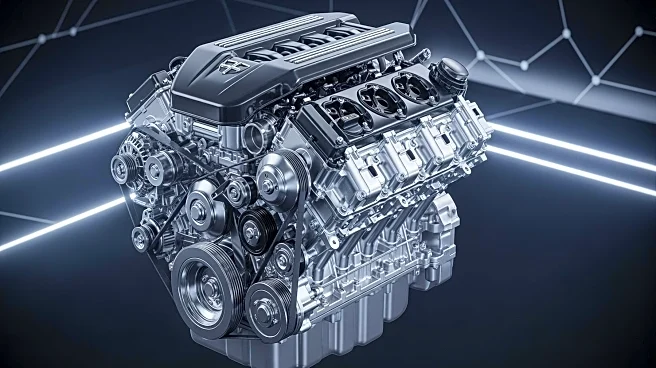What's Happening?
Toyota has announced its ambitious target of achieving over 400 horsepower with its new four-cylinder engine, the G20E. This engine, which was recently tested in competition, is part of Toyota's strategy to develop more efficient and powerful powertrains.
The G20E, derived from the G16E used in models like the GR Yaris and GR Corolla, was tested by company chairman Akio Toyoda, who finished third in a race at the Okayama Circuit. The engine is designed to run on a 20-percent ethanol blend and can be mounted in various configurations, enhancing its versatility for different vehicle types. Toyota plans to introduce this engine in new models by late 2026, alongside other variants like a 1.5-liter engine. The development of these engines is expected to revolutionize vehicle design by allowing for lower hoods and improved aerodynamics.
Why It's Important?
The development of the G20E engine signifies Toyota's commitment to innovation in automotive engineering, particularly in enhancing performance while maintaining efficiency. This move could position Toyota as a leader in the transition towards more sustainable and powerful vehicles. The introduction of engines capable of running on ethanol blends aligns with global trends towards reducing carbon emissions and reliance on fossil fuels. For consumers, this could mean access to vehicles that offer both high performance and better fuel economy. The automotive industry may see increased competition as other manufacturers strive to match Toyota's advancements, potentially leading to more rapid technological developments and a shift in market dynamics.
What's Next?
Toyota is expected to continue refining the G20E engine and its variants, with plans to launch vehicles equipped with these engines by late 2026. The company is also hinting at the revival of iconic models like the Celica and Supra, which could feature these new powertrains. Additionally, Toyota's commitment to developing a GT3-derived supercar suggests a focus on high-performance vehicles that could appeal to enthusiasts. As these developments unfold, industry stakeholders, including competitors and consumers, will be watching closely to see how Toyota's innovations influence the broader market.
Beyond the Headlines
Toyota's focus on developing engines that support ethanol blends highlights a broader industry trend towards alternative fuels. This could have significant environmental implications, as increased use of ethanol can reduce greenhouse gas emissions. Moreover, the ability to mount the G20E engine in various configurations could lead to more versatile vehicle designs, potentially influencing future automotive engineering standards. As Toyota continues to innovate, it may also drive regulatory changes and encourage other manufacturers to adopt similar technologies, contributing to a more sustainable automotive industry.















